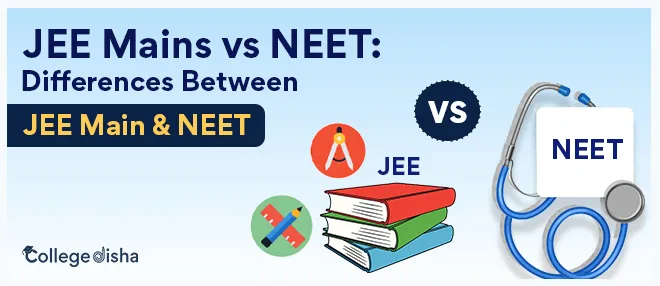
Update on 2024-04-15
JEE Mains vs NEET: Differences Between JEE Main & NEET | Which is Tougher?
IIT JEE and NEET are the most esteemed and general exams for senior secondary students. Both the exams are National-level examinations that list students in undergraduate programs of engineering and medical individually.
These national-level entrance exams are often given after class 12th to select the stream of science. IIT JEE and NEET are very tough because of the limited seat availability and the pattern of the paper.
But when we look closer into it, there is a huge difference, and that’s not talking in perspective of the level of difficulty but about disturbing one’s career and putting the groundwork for everything.
If these two examinations sound to be so identical, what makes them apart? If we too are looking for the answers to these questions, then here are a few things these two look at the dissimilarities between the two exam industries.
JEE means Joint Entrance Exam; this exam is directed to providing admissions to qualified candidates for various engineering graduation like Bachelor in Engineering (B.E.) and Bachelor in Technology (B.Tech.)
The purpose of the Common Entrance Test for a total of 24 Indian Institutes of Technology campuses, 33 National Institute of Technology campuses, 19 Indian Institute of Information Technology campuses, and 20 other Government Funded Technical Institutes (GFTIs).
NEET means for National Eligibility cum Entrance Test and is led for providing admissions in various undergraduate medical courses in MBBS and dental courses (BDS) in government as well as private medical and dental colleges in India. NEET is a solo entrance test for admissions to more than 68,000 MBBS and BDS seats across India.
JEE Mains and NEET Exam: Highlights
- Total Number of Questions asked in NEET 2025: The number of total questions in the NEET 2025 exam is 200 but aspirants have to attempt only 180 questions.
- Frequency 2 times a year: Once a year
- Languages: Assamese, Bengali, English, Gujarati, Hindi, Kannada, Malayalam, Marathi, Oriya, Punjabi, Tamil, Urdu, and Telugu.
- 12th Class Cutoff for Eligibility General: 75%Reserved – 65% General – 50%OBC – 45%SC/ST/PWD – 40%
- Exam fees for JEE: General/ OBC: boys-Rs 650, Girls- Rs 325 SC/ST/PwD/, Transgender Boys-Rs 325 Girls- Rs 325
- Exam fee for NEET: General Category- Rs 1500
- General EWS/ OBC: Rs 1400 ST/ SC/ PWD/-Rs.800
- Official websites of JEE and NEET: https://jeemain.nta.nic.in and https://neet.nta.nic.in/
JEE Mains vs NEET 2025
The most important difference between the two lies in selecting the professional course like for engineering we have to apply in JEE mains and for medical go for NEET. Another instant change we see is the weightage of specific subjects like NEET has more weightage on Biology and JEE has on Math.
In the table below we will come to know the major differences between the two prevalent exams in India:
| Basis | JEE (Mains) | NEET |
| Abbreviation for | Joint Entrance Examination | National Eligibility cum Entrance Test |
| Type | Computer-Based Test | Pen and paper-based |
| Subjects/ skills | Paper 1: Physics, Chemistry, and Mathematics | Drawing, and Planning |
| Paper 2:Mathematics, Aptitude | Biology, Chemistry, and Physics | |
| Number of Questions | 90 (30 each subject) | 180 Questions |
| Duration | 3 hours | 3 hours |
JEE Main Marking Scheme 2025: Paper 1 (B.E/B.Tech)
- MCQs: Four marks will be awarded for each correct answer and there will be a negative marking of one mark on each wrong answer.
- Questions with Numerical Value Answers: Candidates will be given four marks for each correct answer and there will be a negative marking of 1 mark for each wrong answer.
JEE Main Marking Scheme 2025: Paper 2 (B.Arch & B.Plan)
- MCQs: Candidates will be given four marks for each correct answer and there will be a negative marking of one mark on each wrong answer.
- Questions with Numerical Value Answers: Students will be given four marks for each correct answer and there will be a deduction of one mark for each wrong answer.
- Drawing Test: Two questions are evaluated out of 100 marks.
NEET Marking Scheme 2025
- 4 marks will be awarded for each correct answer
- One mark will be deducted for each wrong attempt
- No marks for unanswered question
Used for: Admission to undergraduate Engineering and architecture courses in 32 NITs, 24 IITs, and other colleges. Also supports a prelim selection for JEE Advanced.
Admission for undergraduate medical courses in government and private colleges. Passing is mandatory for pursuing the same abroad.
How Many Times Can We Give JEE Main?
A candidate can give JEE Main exam six times over a period of three consecutive years. In a year, a candidate can appear for JEE Main twice in the months of January and April.
If the candidate passes the 12th exam in 2025 then the candidate can appear in 2025 and 2024 JEE Main.
How Many Times Can We Give NEET Exam?
As per the regulatory board for NEET exams, the NTA (National Testing Agency), there is no restriction on the number of attempts for the NEET exams.
Conclusion: So, now we can decide that both the entrance exams are methods for two very dissimilar professional futures. NEET is for the medical course and JEE Mains for the engineering stream.
NEET is somewhat more challenging than JEE Main but easier than JEE Advanced, but that is always controversial, as seats are moderately limited in NEET making it more competitive.
But in the end, it boils down to one’s preference, liking, and know-how. Apart from this, the syllabus for the two papers is slightly similar to physics and chemistry, but cannot trust the preparation for cracking another. All the subjects must be carefully studied by the candidates.
Related Articles
Trending News
Copyright @2024.www.collegedisha.com. All rights reserved
